|
|
|
Sort Order |
|
|
|
Items / Page
|
|
|
|
|
|
|
| Srl | Item |
| 1 |
ID:
129803


|
|
|
|
|
| Publication |
2014.
|
| Summary/Abstract |
Looking primarily at the Israeli side of the conflict, one sees many factors that have contributed to the failure of past peace efforts, most of which may be present or repeated in current (2014) and possibly future - attempts at peace making.
|
|
|
|
|
|
|
|
|
|
|
|
|
|
|
|
| 2 |
ID:
129799
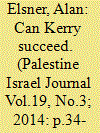

|
|
|
|
|
| Publication |
2014.
|
| Summary/Abstract |
During the many years of US Diplomacy in the Middle East, it has become a cliché to state that the United States cannot want peace more than the Israelis and Palestinians themselves.
|
|
|
|
|
|
|
|
|
|
|
|
|
|
|
|
| 3 |
ID:
129801
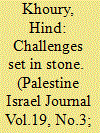

|
|
|
|
|
| Publication |
2014.
|
| Summary/Abstract |
What are the challenges to peace in 2014? The date is worth emphasizing, since attempts to broker peace in the Middle East are anything but new. In fact, the 1979 David Accords with Egypt are already 35 year old, and the Israeli-Palestinian peace process in entering its 23rd year. The process is growing stronger, but genuine peace is weakening by the day. In the meantime, there have been countless studies, articles, books, maps and reports addressing all aspects in the conflicts.
|
|
|
|
|
|
|
|
|
|
|
|
|
|
|
|
| 4 |
ID:
131459
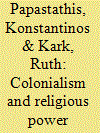

|
|
|
|
|
| Publication |
2014.
|
| Summary/Abstract |
This article critically assesses the conflict within the Orthodox Church of Jerusalem between the Greek hierarchy and the Arab laity concerning the proposals of the Mandatory Government for a new regulatory framework for patriarchal operation. The British presented two draft reform ordinances, neither of which met Arab expectations. Instead of promoting the laity's emancipation from 'foreign' Greek administrative and financial control, the ordinances left little room for a true inversion of the power structure between the two opposing camps, retaining the status quo at the expense of the Arab Orthodox rights.
|
|
|
|
|
|
|
|
|
|
|
|
|
|
|
|
| 5 |
ID:
133383
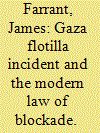

|
|
|
|
|
| Publication |
2014.
|
| Summary/Abstract |
A case study is presented concerning the May 2010 Israeli Defense Forces (IDF) boarding of a flotilla of ships attempting to breach a blockade in the Mediterranean Sea. It particularly focuses upon clashes between the IDF and the human rights activist passengers and crew of the largest ship in the flotilla, known as the "Mavi Marmara." The article discusses blockade law, the concepts of international armed conflict (IAC) and non-international armed conflict (NIAC), and whether Israel and the Islamic organization Hamas engaged in a NIAC.
|
|
|
|
|
|
|
|
|
|
|
|
|
|
|
|
| 6 |
ID:
128082
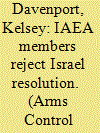

|
|
|
|
|
| Publication |
2013.
|
| Summary/Abstract |
A resolution critical of Israel's nuclear program, revived after a two-year hiatus, failed to pass the General Conference of the International Atomic Energy Agency (IAEA) last month. The nonbinding resolution, sponsored by a group of 18 Arab states, would have called on Israel to join the nuclear Nonproliferation Treaty (NPT) as a non-nuclear-weapon state and put all of its nuclear sites under comprehensive IAEA safeguards. The measure, referred to as "Israeli Nuclear Capabilities" on the IAEA agenda, failed by a vote of 43-51 on Sept. 20, the last day of the conference.
|
|
|
|
|
|
|
|
|
|
|
|
|
|
|
|
| 7 |
ID:
133211
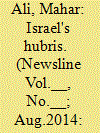

|
|
|
|
|
| Publication |
2014.
|
| Summary/Abstract |
The prime minister of Israel, Benjamin Netanyahu, has a problem with "telegenically dead" victims of his nation's formidable firepower. It is the sort of phrase that Adolf Hitler or Josef Goebbels might have been expected to come up with, had television existed in the 1930s or '40s, and chosen to focus on the Jewish victims of the Nazi killing machine.
|
|
|
|
|
|
|
|
|
|
|
|
|
|
|
|
| 8 |
ID:
134177
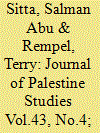

|
|
|
|
|
| Publication |
2014.
|
| Summary/Abstract |
The internment of thousands of Palestinian civilians in Israeli-run prisoner of war camps is a relatively little known episode in the 1948 war. This article begins to piece together the story from the dual perspective of the former civilian internees and of the International Committee of the Red Cross (ICRC). Aside from the day-to-day treatment of the internees, ICRC reports focused on the legal and humanitarian implications of civilian internment and on Israel's resort to forced labor to support its war effort. Most of the 5,000 or so Palestinian civilians held in four official camps were reduced to conditions described by one ICRC official as "slavery" and then expelled from the country at the end of the war. Notwithstanding their shortcoming, the ICRC records constitute an important contribution to the story of these prisoners and also expose the organization's ineffectiveness-absent a legal framework as well as enforcement mechanisms beyond moral persuasion, the ICRC could do little to intervene on behalf of the internees.
|
|
|
|
|
|
|
|
|
|
|
|
|
|
|
|
| 9 |
ID:
132214


|
|
|
|
|
| Publication |
2014.
|
| Summary/Abstract |
Militant organizations pursue two common aims: to survive and to achieve the goals that define their raison d'être. Yet, elements that sustain the life spans of militant organizations are not necessarily the same components that advance the accomplishment of their core, or "outcome," goals. Further, some organizational practices, such as the use of suicide attacks, generate a tradeoff that bolsters survivability while detracting from the effective pursuit of outcome goals. This study demonstrates that three operating conditions explain variation in the duration and achievement of contemporary militant organizations: receptiveness to tradeoffs, levels of external support, and the nature of adversaries. As such, the unique effects of different operating conditions reveal why many militant organizations survive for long periods of time but only a few achieve the goals that justify their existence.
|
|
|
|
|
|
|
|
|
|
|
|
|
|
|
|
| 10 |
ID:
132209
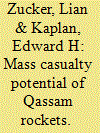

|
|
|
|
|
| Publication |
2014.
|
| Summary/Abstract |
In spite of the bombardment of southern Israel by thousands of Qassam rockets fired from the Gaza Strip, comparatively few people have been injured or killed. This has led some observers to dismiss Qassams as more of a symbolic than lethal threat. However, southern Israeli towns feature robust civil defense systems that include safe rooms, bomb shelters, early detection alarms, and missile defense. How many casualties would occur were such systems not in place? This article applies shrapnel-casualty and spatial allocation models to the population of the southern Israeli town of Sderot to estimate casualties per randomly aimed rocket fired into the unprepared town; that is, in the absence of civil defense (technical details appear in the Appendix). Assuming an injury radius of only 5 meters from impact, the modeled expected casualties per rocket are between three (best-case) and nine (worst-case) times higher than Sderot's observed casualties-to-rocket ratio, suggesting that Qassam-like terror attacks on unprotected urban locations could prove much more serious than what one would expect based solely on the observed number of casualties in Sderot.
|
|
|
|
|
|
|
|
|
|
|
|
|
|
|
|
| 11 |
ID:
132012
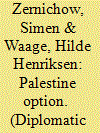

|
|
|
|
|
| Publication |
2014.
|
| Summary/Abstract |
Were the Palestinians anything more than simply a refugee problem? Since the creation of the State of Israel in 1948, the USA had pretty much ignored this haunting question. However, as the Palestinian guerrillas' wide-ranging armed struggle seemed to be approaching a climax in 1970, U.S. policy makers were forced to reassess whether they might also need to view the Palestinian issue as a political problem. In April to May of that year, U.S. State Department officials began to doubt whether the Jordanian regime would survive the civil war then brewing in that country. In response, a strategy paper examining the possibility of a joint Jordanian-Israeli-Palestinian settlement-a policy that would come to be known as the "Palestine" or "Palestinian option"-was developed within the U.S. State Department. Between October and December 1970, the National Security Council discussed various versions of this strategy paper. At the same time, members of the main Palestinian guerrilla organization, Fatah, sent messages to the Americans indicating that they might be willing to enter into negotiations. Why, then, did these efforts fail to bring about a change in U.S. policy toward the Palestinians?
|
|
|
|
|
|
|
|
|
|
|
|
|
|
|
|
| 12 |
ID:
124366
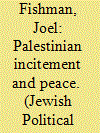

|
|
|
|
|
| Publication |
2011.
|
| Summary/Abstract |
Persistent reports describe the pervasiveness and intensity of Palestinian incitement against Israel. The Palestinian Authority is an oligarchy whose purpose is war against Israel. Its leaders consider deception and the "armed struggle" as the legitimate means by which they can achieve their goals and have adapted their educational system to fill the younger generation with hatred and the desire to perpetrate terrorist acts. Because of the reality behind it, incitement is the real "deal-breaker." One side wants peace, while the other does not.
|
|
|
|
|
|
|
|
|
|
|
|
|
|
|
|
| 13 |
ID:
129804
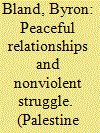

|
|
|
|
|
| Publication |
2014.
|
| Summary/Abstract |
The purpose of a peace process is to reach and implement an agreement that ushers forth peace. The belief is that negotiations will lead to a settlement that, if properly implemented, will create peace where previously only animosity and violence had existed. Acting under this paradigm international actors- the United States, the European Union, the United Nations, etc.
|
|
|
|
|
|
|
|
|
|
|
|
|
|
|
|
| 14 |
ID:
132220
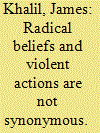

|
|
|
|
|
| Publication |
2014.
|
| Summary/Abstract |
This article develops and elaborates on three core points. First, as with research into other social science themes, it is argued that it is necessary to apply the logic of correlation and causality to the study of political violence. Second, it highlights the critical disjuncture between attitudes and behaviors. Many or most individuals who support the use of political violence remain on the sidelines, including those who sympathize with insurgents in Afghanistan (reportedly 29 percent in 2011), and those supportive of "suicide attacks" in the Palestinian Territories (reportedly reaching 66 percent in 2005). Conversely, those responsible for such behaviors are not necessarily supportive of the ostensible political aims. Third, it is argued that the motives that drive these attitudes and behaviors are often (or, some would argue, always) distinct. While the former are motivated by collective grievances, there is substantial case study evidence that the latter are commonly driven by economic (e.g., payments for the emplacement of improvised explosive devices), security-based (i.e., coercion) and sociopsychological (e.g., adventure, status, and vengeance) incentives. Thus, it is necessary for the research community to treat attitudes and behaviors as two separate, albeit interrelated, lines of inquiry
|
|
|
|
|
|
|
|
|
|
|
|
|
|
|
|
| 15 |
ID:
134178
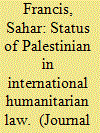

|
|
|
|
|
| Publication |
2014.
|
| Summary/Abstract |
This essay addresses the legal status of Palestinian political prisoners under international humanitarian and human rights law. At the heart of this issue lies the fundamental question of Israel's right to arrest hundreds of thousands of Palestinians, put them on trial before arbitrary military courts, and treat them as criminals in its capacity as the occupying power given the internationally-recognized right of Palestinians to resist occupation and pursue self-determination. This question takes on all the more urgency considering the illegal nature of the Israeli occupation1 and given that the laws and rules of war are applicable to Palestinian detainees as their status conforms to the definition of prisoners of war and civilians under occupation pursuant to the Geneva Conventions of 1949.
|
|
|
|
|
|
|
|
|
|
|
|
|
|
|
|
| 16 |
ID:
133585
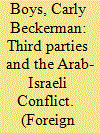

|
|
|
|
|
| Publication |
2014.
|
| Summary/Abstract |
What role do third parties play in the Arab-Israeli conflict, and to what extent do domestic political constraints shape this role? Answering these questions has important ramifications for understanding the interplay between domestic and international politics. One useful tool to conduct this research is the two-stage decision-making framework, Poliheuristic (Ph) Decision Theory, which eliminates options from the choice set that do not meet domestic political requirements. This paper applies Ph theory to a case study from the conflict's infancy, the British decision in 1922 to affirm the policy of a Jewish national home (based on the Balfour Declaration 1917) despite violent Arab opposition. It argues that the decision was based solely on domestic political needs and did not attempt to address tensions in Palestine. It concludes that Ph theory provides a highly effective theory of decision-making for assessing motivations and policy decisions of third parties in the Arab-Israeli conflict.
|
|
|
|
|
|
|
|
|
|
|
|
|
|
|
|
| 17 |
ID:
128905
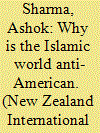

|
|
|
| 18 |
ID:
130504
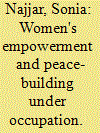

|
|
|
|
|
| Publication |
2011.
|
| Summary/Abstract |
As a contribution to the discussion on women's empowerment in the Palestine-Israel Journal, this article reflects on the possibilities for women's empowerment and peace-building under a condition of prolonged occupation. Specifically, it focuses on the near-impossibility of the manifestation of empowerment and peace for those who have been disenfranchised under a paradigm of extreme oppression in the context of Occupied Palestine. If one uses Eileen Kuttab's contextualization of Palestinian empowerment as historically being embodied in practices of mobilization and resistance, then being allowed neither mobility nor the right to organize resistance to Israeli military violence makes it clear that the prospects for successful peace-building and the realization of Palestinian women's empowerment face significant obstacles.1 This is a result of the autocratic imbalance of power that has seeped from external into internal dynamics. The external factors are the architects and participants of the occupation comprised of an illegal Israeli military occupation force of women and men, abetted by an international community that does not adhere to its mandates to the fullest extent and follows an aid praxis that further serves to annihilate mobilization and resistance. The internal obstacles to women's empowerment are an extension of the external, that is, elements of the Palestinian local governing structure that was meant to be temporary in nature.
|
|
|
|
|
|
|
|
|
|
|
|
|
|
|
|
|
|
|
|
|